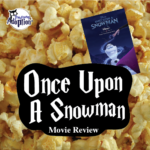
Once Upon a Snowman (2020)
Review
Once Upon a Snowman – Comprehensive Review
Transfiguring Adoption’s Overview:
The target audience for the short film Once Upon a Snowman (2020) appears to be children aged 3 and up. It also appears this movie would be best for any family wishing to revisit the world of Arendelle. This short film may be relatable especially to foster or adoptive children due to feeling a sense of missing identity when separated from their family of origin, as Olaf feels once separated from Queen Anna mid-transformation.
** Spoilers Could Be Ahead **
How Is This Relevant To Adoption & Foster Care?
Once Upon a Snowman (2020) shows us the origin story of Olaf and gives us the answers to what happened to him between the time that Queen Elsa reanimates him and when he meets up with Princess Anna, Kristoff, and Sven. While Olaf may not himself be a foster or adoptive child, he is a newly summoned creature that does not know his own name or who he is and wishes to find his purpose.
Through the very short film we see Olaf remember his name, discover the beauty of summer, and remember that he loves warm hugs. While this is a very short film this can be a wonderful medium to help children talk about the feelings of loss and confusion they may feel during transitions and trying to figure out who they are in all of the change.
Discussion Points:
- Identity
This is a fairly short film at less than 12 minutes of actual film screen time so I will only focus on Olaf’s mission to discover his identity. Like many children from the child welfare system, Olaf (literally) transitions several places in a small space of time and interacts with the people, animals, and objects he comes across on this brief journey. Children who have endured trauma may suffer a loss of identity when separated from their family of origin, culture, friends, and all of the other things that are familiar and, like Olaf, may need some time and guidance to reorient themselves with their new normal and how to best move forward. This illustration from Olaf can help us talk to children about these shifts and discoveries in identity.
Cautionary Points:
- Fantasy Violence
Olaf doesn’t suffer irreparable harm throughout the short film but he does have some accidents and brushes with violence. He is knocked off a mountain by Queen Elsa’s cape, has a door slammed on him, is chased by wolves, falls off mountains a few more times, and is nearly injured in a sleigh wreck and explosion. Olaf is able to piece himself back together and move on, but this may be a trigger for children who have endured trauma and have over-stimulated stress responses. - Inappropriate Humor
Olaf makes a joke about the shop’s name “Wandering Oaken” being an anagram for “Naked Norwegians”. He also for a moment has a toilet plunger for a nose. While the anagram joke may fly over most kids’ heads they will definitely notice the word “naked” being uttered and some children may try to emulate the joke for a reaction. There may also be potty-humor talk as a result of the plunger used for a substitute nose. - Gets Lost In Woods
While Olaf is not a literal child, he is a child-like character who is lost and confused in the woods. Olaf even expresses this verbally while wandering alone in the dark woods. Though this likely won’t trigger most children, if a child has had a traumatic experience with getting lost in the dark or in the woods this may be problematic and something to watch out for.
[Donate to this Project]
NOTE: Inclusion on these lists does not necessarily mean endorsement. Furthermore, with all our resources, we highly recommend you preview them first to determine if there are any trauma triggers that your child may not be ready to handle. Transfiguring Adoption does not intend for its reviewers nor its reviews to be professional, medical or legal advice. These reviews and discussion guides are intended to help parents to better be able to connect and understand their children who come from traumatic backgrounds.